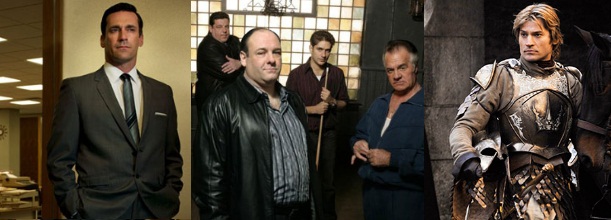Small Screen/Silver Screen: How TV is taking on Hollywood

Game of Thrones, HBO’s new fantasy epic, opened on television to much fanfare. The books the series have been adapted from are an ongoing successful fantasy staple and its fan base border on obsessive. After having watched the first four episodes, and enjoyed them immensely, it seems obvious this show will have a scope rarely seen on television before. Until recently such projects were exclusively film based; television lacked the money to make high quality programmes like this and when it tried it often created much mocked failures. The same could be said for science fiction; the original Battlestar Galactica was made to be Star Wars on television and was a dismal failure in comparison.
From the complicated and impressive title scene onwards Game of Thrones shows that the programme has the budget to successfully carry off a fantasy programme. And, of course, it is not the only one. True Blood has vampires, werewolves and more; Boardwalk Empire recreated prohibition era Atlantic City to the same level of any film and The Walking Dead’s zombies easily match anything from Hollywood. Clearly television has its eyes on new territory, territory that once was the exclusive property of films. What is even more impressive is that it is not only in budget that television is now competing.

For decades television was seem as the cheap, tacky, intellectually inferior medium to film. It had soap operas, gameshows, reality television; film had swords and sandal epics, mind-blowing science-fiction, heart-wrenching drama. Film was art while television, by and large, wasn’t. Obviously the need to fill twenty-four hours across more and more channels means that most television will not be well-written dramas or brilliant sitcoms but things that are cheap and easy to make, but in recent years an increasing number of television shows compete not just on special effects but in quality of writing, acting and ability to handle difficult ideas and topics.
To return to Game of Thrones, it is a programme featuring intrigue, well-developed characters, shades of grey morality, complicated relationships and scheming lovers. Other programmes are at it as well, dealing with complicated ideas and not traditionally appealing characters. Breaking Bad features a high school chemistry who turns into a crystal meth dealer when diagnosed with cancer, Mad Men has the philandering, borderline alcoholic , identity- stealing Don Draper, who despite all his faults is often more appealing than most of his colleagues or even his the wife he cheats on. Television can also do things film just can’t, In Treatment is a show set almost exclusively in the sessions between a psychiatrist and clients, Season 1 is over forty episodes long, telling a story and developing characters in a way impossible for films.
The Sopranos was the first time I was really aware of this change in television (all my life I have considered film vastly superior). Often cited as the best television show ever, it is as good as The Godfather (which itself always comes near the top on lists of the best films ever) and while the characters on The Sopranos quote The Godfather, the series surely matches the feature film as a cultural touchstone for the Mafia/gangster genre. In the recent film The Social Network, to make a point about getting violent, one of the characters suggests they hire Tony Soprano. In the past they would have easily said they would send him a horse’s head. In the future will the infamous exploits of the Corleone’s be overshadowed by The Sopranos?
A lot of this can be brought back to HBO, the American television channel perhaps responsible for this change in perception. Much of their programming – even programmes which I don’t like, *cough* Sex and the City *cough* – can be said to have moved television forward. HBO is freed from the broadcasting rules of the bigger networks, allowing them to make more challenging programmes. But even with their rules, the major networks are also putting out their own quality shows.
Actors also seem aware of this shift. Boardwalk Empire stars Steve Buscemi; not only a film star but an actor associated with intelligent, independent films. Gabriel Byrne stars in the glacially slow but brilliant In Treatment and Laura Linney is wonderful as Cathy Jamison in The Big C. While once a film star moving into television would be seen as a demotion and sign of a failing career, if they pick the right show it can be the creatively superior choice.
However, television still fails in many regards. For every Sopranos and reimagined Battlestar Galactica (a show that dealt with religious intolerance, terrorism, torture and more), there are the cancelled shows. Arrested Development was critically a huge success but cancelled after three seasons. Joss Whedon, a one-man quality television factory, created Firefly which was cancelled after one season but brought it back and achieved perhaps greater recognition as the film Serenity. Both examples of programmes that tried to be clever and different and perhaps failed because of it. Even HBO’s slogan, “It’s Not TV, It’s HBO” is painfully aware of the drawbacks of the medium it works in, trying to distance itself from the majority of television output. And while all these shows continue to be made there is still the familiar lowest common denominator of television shows, often on the same networks, dragging down all of television.
Film perhaps can learn from the renaissance in television. While there are numerous excellent films being made, Hollywood seems stuck in sequels, franchises, adaptations of things not worth adapting and bringing back 3D. People have predicted that television will destroy film since the invention of the television, but actually it’s becoming clear that both mediums need one another: through competing for budget, for audiences and for creative originality, hopefully we’ll get the best out of both worlds.
By Richard Norton









Recent Comments